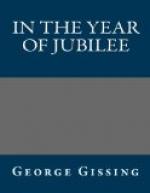It made a salutary distraction in her life. As December drew near, she exhibited alarming symptoms of over-work, and but for the romance which assured to her an occasional hour of idleness, she must have collapsed before the date of her examination. As it was, she frightened one of her pupils, at the end of a long lesson, by falling to the floor and lying there for ten minutes in unconsciousness. The warning passed unheeded; day and night she toiled at her insuperable tasks, at times half frenzied by the strangest lapses of memory, and feeling, the more she laboured, only the more convinced that at the last moment every fact she had acquired would ruthlessly desert her.
Her place of abode favoured neither health nor mental tranquillity. It was one of a row of new houses in a new quarter. A year or two ago the site had been an enclosed meadow, portion of the land attached to what was once a country mansion; London, devourer of rural limits, of a sudden made hideous encroachment upon the old estate, now held by a speculative builder; of many streets to be constructed, three or four had already come into being, and others were mapped out, in mud and inchoate masonry, athwart the ravaged field. Great elms, the pride of generations passed away, fell before the speculative axe, or were left standing in mournful isolation to please a speculative architect; bits of wayside hedge still shivered in fog and wind, amid hoardings variegated with placards and scaffolding black against the sky. The very earth had lost its wholesome odour; trampled into mire, fouled with builders’ refuse and the noisome drift from adjacent streets, it sent forth, under the sooty rain, a smell of corruption, of all the town’s uncleanliness. On this rising locality had been bestowed the title of ‘Park.’ Mrs. Morgan was decided in her choice of a dwelling here by the euphonious address, Merton Avenue, Something-or-other Park.
The old mansion—not very old, and far from beautiful, but stoutly built—stood grim and desolate, long dismantled, and waiting only to be torn down for the behoof of speculative dealers in old material. What aforetime was a tree-bordered drive, now curved between dead stumps, a mere slushy cartway; the stone pillars, which had marked the entrance, damaged in the rending away of metal with a market value, drooped sideways, ready at a touch to bury themselves in slime.




